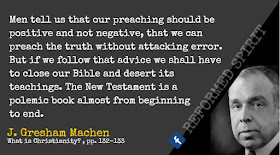Reformed Spirit adheres in the Reformed theology teaching that holds to the authority of Scripture, the sovereignty of God, salvation by grace through Christ, and the necessity of evangelism. Reformers themselves traced their doctrine to Scripture, as indicated by their credo of “sola scriptura,” so Reformed theology is not a “new” belief system but one that seeks to continue apostolic doctrine.
Tuesday, September 29, 2015
Exposing Error thru Biblical Preaching - J. Gresham Machen
Men tell us that our preaching should be positive and not negative, that we can preach the truth without attacking error. But if we follow that advice we shall have to close our Bible and desert its teachings. The New Testament is a polemic book almost from beginning to end.
Some years ago I was in a company of teachers of the Bible in the colleges and other educational institutions of America. One of the most eminent theological professors in the country made an address. In it he admitted that there are unfortunate controversies about doctrine in the Epistles of Paul; but, he said in effect, the real essence of Paul’s teaching is found in the hymn to Christian love in the thirteenth chapter of I Corinthians; and we can avoid controversy today, if we will only devote the chief attention to that inspiring hymn.
In reply, I am bound to say that the example was singularly ill-chosen. That hymn to Christian love is in the midst of a great polemic passage; it would never have been written if Paul had been opposed to controversy with error in the Church. It was because his soul was stirred within him by a wrong use of the spiritual gifts that he was able to write that glorious hymn. So it is always in the Church. Every really great Christian utterance, it may almost be said, is born in controversy. It is when men have felt compelled to take a stand against error that they have risen to the really great heights in the celebration of truth.
--J. Gresham Machen (“Christian Scholarship and the Defense of the New Testament,” in: What is Christianity? , pp. 132-133. See, on this same point, What is Faith? , pp. 41-42; Christianity and Liberalism , p. 17).

No comments:
Post a Comment